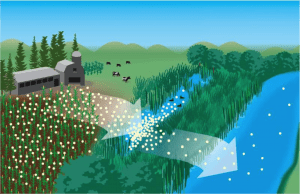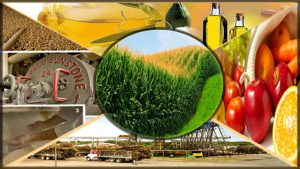 Advantages and Disadvantages Organic Farming pro and cons organic farming
Advantages and Disadvantages Organic Farming pro and cons organic farming
Despite the good things about organic farming why do most farmers still operate by industrialized agriculture?
Here we explore the pros and cons organic farming presents for consumers and producers, as well as examining the environmental effects of organic farming.
Right>> An ecological organic garden where the vegetables sow themselves!
GOOD THINGS ABOUT ORGANIC FARMING
CONSUMER BENEFITS:
Nutrition
The nutritional value of food is largely a function of its vitamin and mineral content. In this regard, organically grown food is dramatically superior in mineral content to that grown by modern conventional methods. organic farming
Because it fosters the life of the soil organic farming reaps the benefits soil life offers in greatly facilitated plant access to soil nutrients.
Healthy plants mean healthy people, and such better nourished plants provide better nourishment to people and animals alike.
Poison-free advantages and disadvantages organic farming
A major benefit to consumers of organic food is that it is free of contamination withhealth harming chemicals such as pesticides, fungicides and herbicides.
As you would expect of populations fed on chemically grown foods, there has been a profound upward trend in the incidence of diseases associated with exposure to toxic chemicals in industrialized societies. disadvantages organic farming advantages and disadvantages organic

Take cancer for example. Representative data on the number of new cancer cases in New South Wales, Australia has been collected by the New South Wales Central Cancer Registry. farmin disadvantages organic farm
ing advantages and disadvantages organic farming
Adjusted to take account of our aging population, their graph (above) shows that between 1972 and 2004 the incidence of new cancer cases per year (average for both sexes) has risen from 323 to 488 per 100,000 people. This is an increase of over 50% in just 32 years. organic farming
Food Tastes Better advantages and disadvantages organic farming
Animals and people have the sense of taste to allow them to discern the quality of the food they ingest.
It comes as no surprise, therefore, that organically grown food tastes better than that conventionally grown. The tastiness of fruit and vegetables is directly related to its sugar content, which in turn is a function of the quality of nutrition that the plant itself has enjoyed.
This quality of fruit and vegetable can be empirically measured by subjecting its juice to Brix analysis, which is a measure of its specific gravity (density). The Brix score is widely used in testing fruit and vegetables for their quality prior to export.
Food Keeps Longer
Organically grown plants are nourished naturally, rendering the structural and metabolic integrity of their cellular structure superior to those conventionally grown. As a result, organically grown foods can be stored longer and do not show the latter’s susceptibility to rapid mold and rotting.
GROWER BENEFITS: advantages and disadvantages organic farming
A healthy plant grown organically in properly balanced soil resists most diseases and insect pests.
This was proven by US doctor and soil nutrition pioneer Dr Northern who conducted many experiments to test the hypothesis during the 1930’s.
Disease and Pest Resistance
For instance, in an orange grove infested with scale, he restored the mineral balance to part of the soil and the trees growing in that part became clean while the rest remained diseased.
By the same means he grew healthy rosebushes between rows that were riddled by insects, and tomato and cucumber plants, both healthy and diseased, where the vines intertwined. Northern observed that the bugs ate up the diseased and refused to touch the healthy plants!
Weed Competitiveness
Weeds are nature’s band-aids, placed by the wisdom of creation to heal and restore damaged soils. When farmers husband the life of the soil, as they do in organic agriculture, the improved conditions dissuade many weeds and favor their crops. The crops, being healthier, are also better able to compete with those weeds that are present.
Lower Input Costs
By definition, organic farming does not incur the use of expensive agrichemicals – they are not permitted! The greater resistance of their crops to pests and the diseases save farmers significantly in expensive insecticides, fungicides and other pesticides.
Fertilizers are either created in situ by green manuring and leguminous crop rotation or on-farm via composting and worm farming. Biodynamic farmers use a low cost microbial solution sprayed onto their crops.
The creation of living, fertile soil conditions through early corrective soil re-mineralization and strategic Keyline chisel ploughing are significant establishment costs that, however, reap ongoing benefits to production at minimal maintenance.
Drought Resistance
Organically grown plants are more drought tolerant. This was dramatically illustrated to me several years ago when I was fortunate to attend a workshop with Australian organic gardening guru Peter Bennett. A slide he showed us has stuck in my mind ever since: it was a field of wheat, organically grown on re-mineralized soil.
Bisecting the ripening green crop was a wide yellowed strip that had already finished growing and hayed off. He explained that the strip had been nourished using agrichemical fertilizer early in the growing period.
Because chemical fertilizer is soluble, plants are forced to imbibe it every time they are thirsty for water. They can and do enjoy good growth as long as water is readily available. As soon as water becomes limited, however, the soluble nutrient salts in the cells of chemically fed plants are unable to osmotically draw sufficient water to maintain safe dilution. They soon reach toxic concentrations, and the plant stops growing, hays off and dies earlier than it otherwise would have.
Added Value
There is a discerning market of consumers who recognize the greater food value of organic produce and are willing to pay premium prices for it. In an interview with me in 1998, the manager of Heinz-Watties in New Zealand explained how his company had been actively supporting and recruiting farmers to organic production in order to service large and lucrative markets in Japan and Europe.
ORGANIC FARMING DISADVANTAGES
Productivity
Proponents of industrialized agriculture point to its superior productivity. In the short term, this yield is possible by expending massive inputs of chemicals and machinery, working over bland fields of a single crop (monoculture).
However, over the longer time frame, productivity advantages dwindle. In my years working with broadacre farmers in the wheatbelt of WA, it was common for them to remark on how much richer pastures and crops were in their youth.
Industrialized agriculture thrashes the land, and diminishes its soil life to the point where it can no longer function to convert available organic matter into soil fertility. Productivity begins to wane, and attempts to bolster it with increasing chemical inputs (common advice from farm consultants) has a similar effect to flogging a dead horse.
Because it relies on living soil to build fertility, the benefits of organic farming for soil life is fundamental to its methods.ing soil
Organic farming benefits food production without destroying our environmental resources, ensuring sustainability for not only the current but also future generations.
Cultivation
While their conventional counterparts may sow by direct drilling of seed into herbicide treated soils, organic farmers are usually at least partly dependent on cultivation to remove weeds prior to sowing. In contrast to cultivation, direct drilling does not mechanically disrupt soil structure and removes the risk of exposed soil being lost to wind or water erosion.
This is a valid argument where farmers are working marginal quality soils. However, the structure of agrichemically-deadened soils is weakened by the corresponding loss of soil life and thus unable to maintain its integrity under occasional cultivation. So it’s a circular argument!
Structurally sound (life-rich) soils may be cultivated regularly without significant damage, particularly if protected appropriately by windbreaks and Keyline soil conservation measures.
Even the need to cultivate may be questioned… After noticing rice thriving wild amongst weeds on roadsides, Japanese alternative agriculturalist Masanobu Fukuoka succeeded in establishing crops by broadcasting seed coated in clay onto untilled land.
GM Crops
Organic growers do not use genetically modified or engineered food crops, some of which are engineered to tolerate herbicides (e.g. “Roundup Ready Canola”) or resist pests (e.g. Bollworm resistant cotton). Conventional growers, on the other hand, are free to “take advantage” of GM crops.
According to a report from the Directorate-General for Agriculture of the European Commission, productivity gains attributed to GM crops are usually negligible when growing conditions, farmer experience and soil types are factored in, and are often in fact negative. The main advantage farmers using such crops gain is convenience only.
There are worrying indications that GM crops may be associated with harm to both human health and the environment. The main concern is that once they are released it is nigh impossible to “un-release” them.
Time
Indeed, organic farming requires greater interaction between a farmer and his crop for observation, timely intervention and weed control for instance. It is inherently more labor intensive than chemical/mechanical agriculture so that, naturally a single farmer can produce more crop using industrial methods than he or she could by solely organic methods.
observation, timely intervention and weed control for instance. It is inherently more labor intensive than chemical/mechanical agriculture so that, naturally a single farmer can produce more crop using industrial methods than he or she could by solely organic methods.
Skill advantages and disadvantages organic farming
It requires considerably more skill to farm organically. However, because professional farming of any sort naturally imparts a close and observant relationship to living things, the best organic farmers are converted agrichemical farmers.
Organic farmers do not have some convenient chemical fix on the shelf for every problem they encounter. They have to engage careful observation and greater understanding in order to know how to tweak their farming system to correct the cause of the problem rather than simply putting a plaster over its effect.
This is a bigger issue during the conversion period from conventional to wholly organic when both the learning curve and transition related problems are peaking (it takes time to build a healthy farm ecosystem that copes well without synthetic crutches). Organic farmers I have interviewed report that their most valuable remedies and advice come from other organic farmers.







